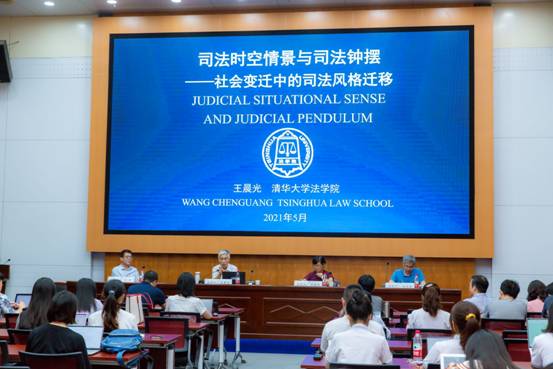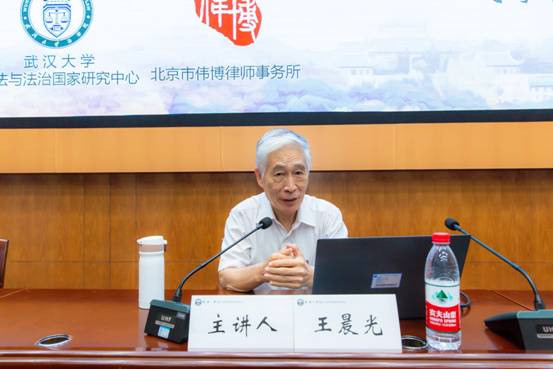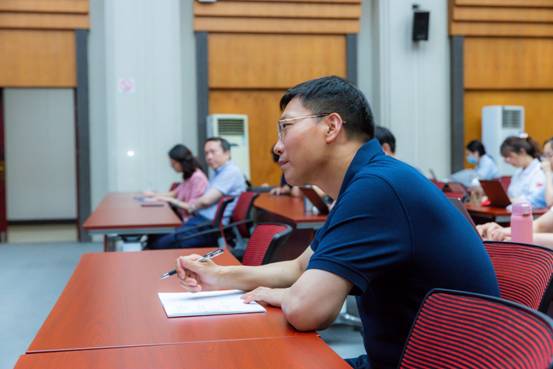On June 21, 2021, the 26th lecture of "Weibo Law Lecture Hall" was held at the Law School. Wang Chenguang, Professor of Tsinghua University School of Law, Director of Research Center of Health Law and Distinguished Professor of Vanke School of Public Health, was invited to give the lecture, and Prof. Lin Lihong and Prof. Liu Xuezai of Wuhan University School of Law discussed around the topic. The lecture was hosted by Professor Feng Guo, Dean of Wuhan University Law School. Professor Wu Yiwen, Vice Dean of Wuhan University Law School, Professor Nie Jianqiang, Deputy Director of Wuhan University Institute of International Law, Professor Feng Jiehan, Vice Director of Wuhan University Academy of International Law and Global Governance, Associate Professor Zhou Wei and more than 30 postgraduate students attended the lecture.

At the beginning of the lecture, Dean Feng Guo introduced the main research areas and important achievements of Professor Wang Chenguang, who has made macro academic achievements in the fields of jurisprudence, comparative jurisprudence and health jurisprudence, and is a pioneer of Chinese health jurisprudence, integrating theoretical jurisprudence and sectoral jurisprudence. Dean Feng Guo expressed his warm welcome and heartfelt thanks to Professor Wang Chenguang for visiting Wuhan University Law School.

Professor Wang Chenguang pointed out that there are still many important issues in some major areas in China which are worthy of research; to study law and do research, one must be able to reflect, know specific things, understand specific systems and delve into specific areas, but also be able to jump out and improve at the theoretical level, and interoperate between macro and micro research in order to make more contributions to the development of the rule of law.
Professor Wang Chenguang gave a lecture on "Judicial Time and Space and Judicial Pendulum - The Migration of Judicial Styles In a Changing Society". He started with the attributes of judicial power, and then gave a lively and in-depth presentation on the migration of judicial styles, theoretical explanations, the dominant judicial decision makers and their qualities, the main factors leading to the migration of judicial styles, and the judicial pendulum in social change.
According to Professor Wang Chenguang, judicial power does not only respond passively to society, but also acts actively on it. Variations in judicial styles are common in both legal systems. Social change inevitably brings about legal change, and legal regulation shapes society to some extent. Justice is not simply formal logical reasoning, but is a sophisticated professional activity that integrates dialectical analysis of complex social issues in a changing social environment. Judges are the makers of judicial decisions and the leaders of judicial migration. Judges must have the ability to look back into the past and look forward to the future, and judicial weighing is one of the key qualities.
Professor Wang Chenguang pointed out that the main factors leading to the migration of judicial styles include: changes in the social phenomena on which legislation is based, the spread of the concept of the rule of law, conflicts in legal regulation, multiple conflicts of interest, major social influences, the emergence of new momentum and opportunities to promote social development, new social phenomena leading to new social laws, the international environment, public psychology and social acceptance, etc.
Prof. Lin Lihong and Prof. Liu Xuezai discussed around the topic. The two professors once again expressed their gratitude to Professor Wang Chenguang, and expressed their feelings and experiences on the topic of the lecture with cases.

Professor Wang Chenguang answered questions from the audience on big data in law, artificial intelligence in trials and the boundaries of judicial activism. The nearly three-hour academic feast came to an end with a round of applause from the audience.
Edited by Wang Yuting & Wu Liuqing

